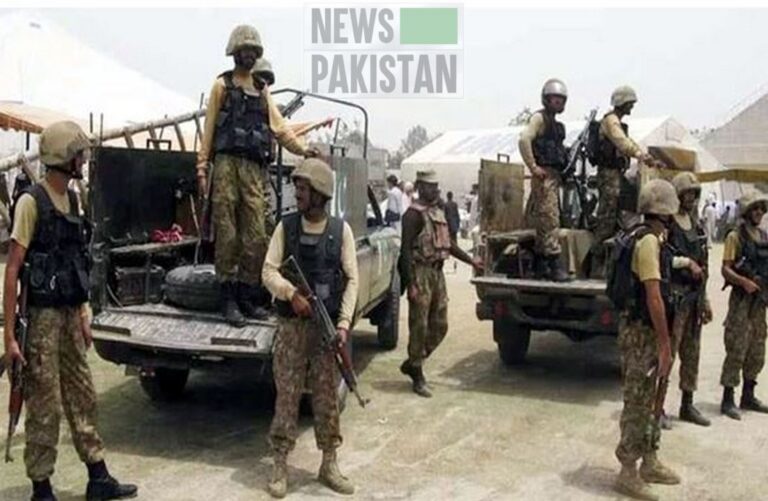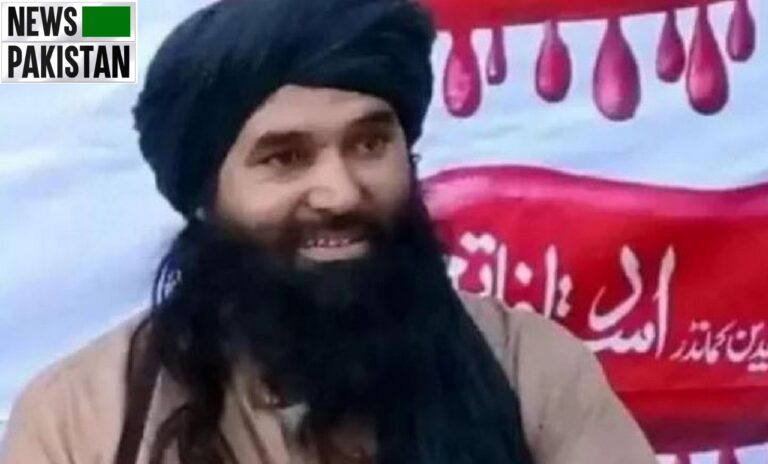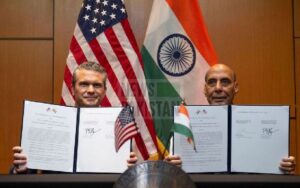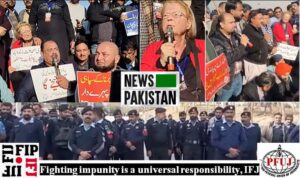KARACHI (NPTV/IFJ): On Sunday (2nd Nov, 2025) the Int’l Federation of Journalists (IFJ) and its affiliates all over the globe are observing the International Day to End Impunity for Crimes Against Journalists (IDEI).
IFJ and it’s affiliates are also demanding governments to adopt a binding international instrument to protect journalists and hold their attackers to account.
Dominique Pradalié, President IFJ, warned: “Allowing killers and attackers of journalists to walk free sends a chilling signal that the powerful can silence voices, crush families, erase stories and escape accountability. Families of these journalists are left bereft and powerless.
“Entire communities lose access to vital information. And the collective right to know is stolen. Fighting impunity is a universal responsibility. We need an international, binding instrument for the protection of journalists, one that obliges governments to take responsibility and act to end the devastating consequences of impunity.”
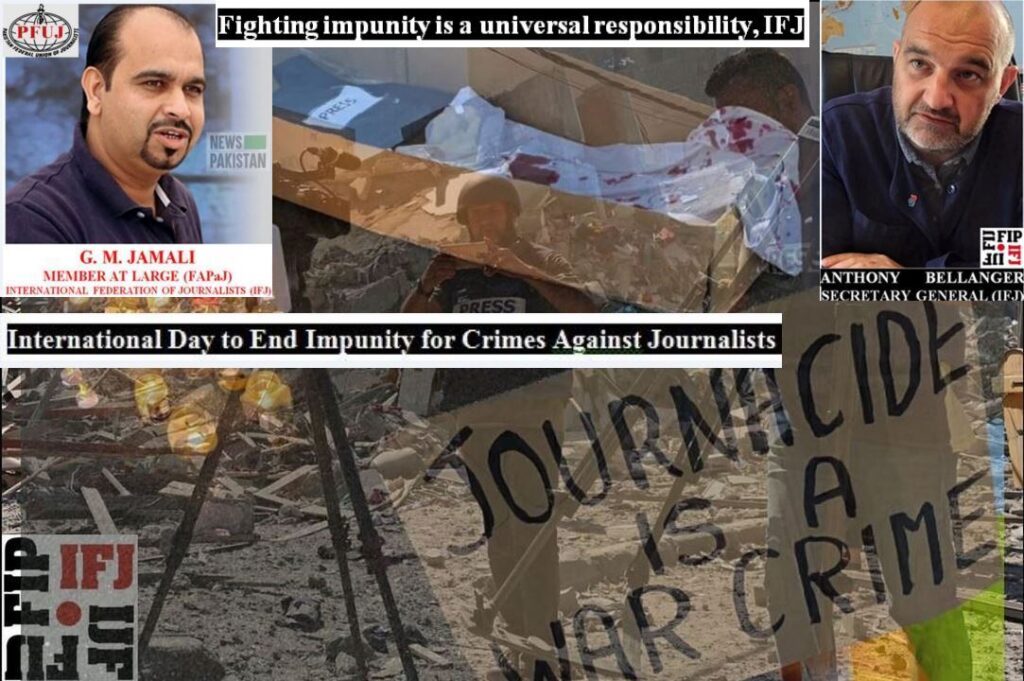
G. M. Jamali, Member At Large FAPaJ, (IFJ), pointed out that during the 10 months of the year 2025, one hundred journalists and Media workers had been slain in the course of their work, the majority in war zones: Eight in Ukraine; six in Sudan and 50 in Gaza (Palestine).
In its annual report International Federation of Journalists (IFJ) informed that 122 journalists and Media workers were slain in the year 2024 all over the world. Across Asia, 22 Media workers were killed, including seven in Pakistan. Israel’s actions in Gaza was responsible for one of the deadliest years for journalists across the globe with 58% of the killed statistics coming from that conflict. In all, 108 men were killed and 14 women.
IFJ cited the case of Punjab journalist Malik Zafar Iqbal Naich, who was shot dead on 12th December, 2024, by two assailants while distributing local newspapers in Rahim Yar Khan.Janan Hussan’s killing has also been mentioned in the report, who was one of 41 people killed in a shooting attack on a convoy in Khyber Pakhtunkhwa.
Anthony Bellanger, Secretary General IFJ in his blog: Gaza, the graveyard of journalism stated: History will only be kind to witnesses. In Gaza, it will remember the name of Anas al-Sharif, a young Al Jazeera reporter killed on August 10, 2025. It will also remember the 222 other journalists murdered in the past two years by the Israeli army. But those who chose to eliminate these media workers will remain condemned forever.
For 24 long months now, Gaza has become the most dangerous place in the world to practise our profession. Israel prohibits foreign journalists from entering the territory, so the truth relies exclusively on Palestinian reporters – almost all of whom are members of the Palestinian Journalists’ Syndicate, affiliated to the IFJ. Too often they work without protection and without refuge for their families. And all too often, they are directly targeted.
Never before has the profession of journalism seen such a massacre in its ranks. The International Federation of Journalists (IFJ), founded in 1926 and celebrating its centenary in Paris in May 2026, has recorded no comparable death toll since its formation, neither during the Second World War, nor in Vietnam, Korea, Syria, Afghanistan or Iraq. Gaza has become the worst graveyard for journalists in contemporary history.
But this is not a series of accidental tragedies. It is a clear strategy: kill the witnesses, close Gaza, lock down the narrative. Preventing the international press from entering means silencing independent foreign observers to this conflict. And at a time when Israeli Prime Minister Benjamin Netanyahu is promising to “recolonise” Gaza, controlling the narrative is as crucial as controlling the territory itself. Colonising also means erasing the ruins, the dead, the survivors and those who tell their stories.
From the northern border to Gaza City, hundreds of thousands of residents have been forced to flee south. But even there the south is no refuge: it offers neither safety nor a way out. Families are crammed together, trapped between bombs and the sea, with no way to escape the atrocities of this war. This reality of total siege is also that of journalists, condemned to work locked in an enclave where survival becomes more improbable every day.
In this context, the recognition of the State of Palestine by a growing number of countries at the UN is symbolic. But it comes too late. It does not protect the living or bring justice to the dead. Diplomacy is catching up with history, but only after the irreparable has been done.
So, who protects these witnesses? It is neither the paralysed UN nor the major powers, complicit through their arms deliveries and their silence. Palestinian journalists continue their mission alone, to the point of exhaustion. To the point of death.
The IFJ, for its part, is taking action on the ground. It directly supports reporters and their families through its International Safety Fund. It recounts the daily lives of its colleagues, Sami, Gharda and others, so that their cruel reality is not reduced to mere statistics. And for several years now, it has been calling for an international UN convention that would oblige states to protect journalists and punish their killers. Until such a convention exists, impunity will prevail and protect the Israeli leaders responsible for these crimes.
An essential reminder repeated for years by the IFJ, to journalists and media workers holding international press cards is: “No story is worth a human life.” This is not a slogan: it is a rule of survival. The mission of journalists is not to die as martyrs, but to report in safety. Their protection is a collective responsibility. Every helmet, every bulletproof vest, every safety and hostile environment training course is vital.
In Gaza, many of our colleagues are asking themselves, “What is the point of continuing?” The evidence is mounting, the testimonies are piling up, and yet nothing is changing. But giving up would be worse because silence is a victory for the executioners. It allows them to say that nothing happened.
One hundred years after its creation, the IFJ faces the most terrible ordeal in its history. Gaza has become journalism’s graveyard. If we accept that reporters die there amid indifference, then we pave the way for other regimes to consider that the assassination of journalists is a normal instrument of war.
Anas al-Sharif did not want to die. He wanted to inform the world, in safety. His death, and that of our 222 colleagues compels us to act.
Israel kills journalists. Killing journalists is killing the truth. And a world without truth is a world where executioners reign supreme.
Newspakistan.tv





